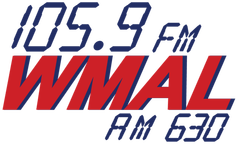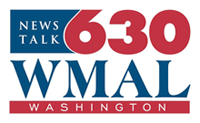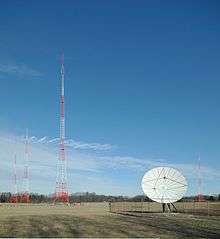WMAL (AM)
 | |
| City | Washington, D.C. |
|---|---|
| Broadcast area | Washington metropolitan area |
| Branding | 105.9 FM & AM 630 WMAL |
| Slogan | Where Washington Comes To Talk |
| Frequency |
630 (kHz) (also on HD Radio) |
| First air date | October 12, 1925 |
| Format | Talk |
| Power |
10,000 watts (day) 5,000 watts (night) |
| Class | B |
| Facility ID | 73250 |
| Callsign meaning |
W-"Martin A. Leese" (founding and former owner) Washington's MALL |
| Affiliations |
Westwood One Premiere Networks Westwood One News ABC 7 |
| Owner |
Cumulus Media (Radio License Holdings LLC) |
| Sister stations | WMAL-FM, WRQX |
| Webcast | WMAL Live Feed |
| Website | www.wmal.com |
WMAL (630 kHz) — branded 105.9 FM & AM 630 WMAL — is a commercial AM news/talk radio station licensed to Washington, D.C. and serving the Washington metro area. It operates with 10,000 watts in the daytime and 5,000 watts in the nighttime with studios in Northwest Washington and its transmitter in Bethesda, Maryland. All programming is simulcast on co-owned WMAL-FM at 105.9 MHz.
WMAL is owned and operated by Cumulus Media and is affiliated with the Westwood One Network (a Cumulus subsidiary) and Premiere Radio Networks. It is one of the oldest radio stations in the Washington Media market, continuously on the air from 1925.
Programming
Weekday mornings on WMAL-AM-FM start with "Breakfast on the Mall" with hosts Brian Wilson and Larry O'Connor. O'Connor returns at 5 p.m. with a one-hour show called "The Drive at Five." At 9 a.m., Chris Plante hosts a show also heard on several other Cumulus stations. The rest of the day, nationally syndicated shows air from Rush Limbaugh, Michael Savage, Mark Levin and John Batchelor. Red Eye Radio is heard overnight. Weekends feature shows on money, health, law and gardening with repeats of some weekday shows and Brokered programming. Most weekday hours feature local news at the beginning of each hour. Westwood One News airs nights and weekends.
History
WMAL first went on the air on October 12, 1925, using call letters incorporating the initials of Martin A. Leese, a local optician who began selling radio sets at 720 11th Street NW in Washington, D.C.,[1] and started WMAL as a low-power station advertised along with his radio business. After the demise of station WCAP left the city with WRC (now WTEM) as its only high-power station, local business leaders affiliated with the City Club of Washington banded together to create a second high-powered station. Their original plan was to buy WCAP and convert it to a municipal station, but instead they worked with Leese to boost WMAL's signal and make it the city's second large station.[2] The new high-power WMAL went on the air from studios at 710-712 11th Street NW on October 2, 1926, with former WCAP announcer William T. Pierson as director and with a policy of encouraging young broadcasting talent in hopes of creating "a people's forum".[3]
In 1927, Leese left his optical business to focus full-time on running the station, and the following year the Federal Radio Commission's national frequency allocation plan assigned WMAL the AM 630 frequency, which it still uses today. WMAL was a CBS affiliate from 1928 until October 19, 1932, and then was briefly unaffiliated until joining the NBC Blue network in January 1933; this network later became ABC, with which WMAL was affiliated for many years.
By mid-1932, M.R. Baker had been appointed manager of the station, and Kenneth H. Berkeley was appointed station director of WMAL in 1933. While still owned by the Leese family, WMAL was eventually leased to the National Broadcasting Company in 1934, joining it with Owned-and-operated station WRC.
NBC’s Washington vice president Frank M. Russell supervised the operation of both WMAL and WRC by 1935 when studios were moved from the National Press Building to the Trans-Lux Theatre Building, 724 14th Street NW. Transmitting facilities continued to be located at 712 Eleventh Street NW.
In the late months of 1937, the lease to NBC was terminated, with station operation reverting to the Leese interests. NBC, however, continued to operate it under a managerial agreement executed in the fall of 1937. Norman Leese was President of WMAL’s licensee at this time. On May 1, 1938, the M.A. Leese Radio Corporation was acquired by publishers of the now-defunct "Washington Evening Star" newspaper, a family-owned concern headed by Board Chairman and President Samuel H. Kauffman. Norman Leese remained President and K.H. Berkeley continued as General Manager of WMAL.
The operating arrangement between NBC and the M.A. Leese Radio Corporation ended in February 1942. The station then reverted to the direct control of the Evening Star Broadcasting Company, of which K. H. Berkeley was executive vice president. Mr. Berkeley was also WMAL’s general manager. In October 1947, WMAL-TV signed on as the first high-band VHF television station in the United States. It became an ABC Network affiliate a year later.
By 1946, S.H. Kauffman, president and part owner of the Evening Star, was given additional duties as president of its broadcasting subsidiary, the Evening Star Broadcasting Company until his resignation in August 1954. His replacement as general manager was Frederick S. Houwink.
Also in 1954, John W. Thompson, Jr. replaced S.H. Kauffman as president of Evening Star Broadcasting Co. Andrew Martin Ockershausen was appointed station manager of WMAL in 1960. In 1962, Fred Houwink became a company vice-president while continuing as WMAL’s general manager. In 1965 Houwink was named Vice President of Evening Star Broadcasting and Ockershausen was elevated to general manager of WMAL.
In 1970 Houwink retired and Ockershausen was named Vice President, Operations. Also in 1970 Richard S. Stakes was named general manager and Harold L. Green was named station manager. In 1974 Charles A. Macatee became WMAL’s general manager.
In early January 1976, the Evening Star Broadcasting Company’s WMAL, WMAL-FM and WMAL-TV and majority control of the ailing newspaper were acquired from the Kauffman, Noyes and Adams families by publisher Joseph L. Albritton’s Perpetual Corporation and Albritton became board chairman and chief owner of WMAL’s license. On January 21, 1976, WMAL’s licensee name was changed to Washington Star Communications of Delaware, Inc. Richard S. Stakes became station president, but resigned in December 1976. Mr. Albritton then assumed the presidency, with Robert Nelson becoming president of the broadcasting division. General Manager Charles Macatee resigned in January 1977.
A requirement of the purchase of the Evening Star properties included the sale of the radio or television properties. In March 1977, WMAL and WMAL-FM were spun off to ABC Radio, while the TV station was retained and became WJLA-TV, named after Albritton's initials. The transfer fetched $16 million, a record price for radio properties at that time. Andrew Ockershausen was appointed executive vice president.

On January 3, 1986, Capital Cities and ABC, Inc. merged in a $3.52 billion deal. Thomas S. Murphy was chairman and CEO of the new firm. Frederick Weinhaus became president and general manager following the resignation of Andrew Ockershausen in March 1986. Weinhaus was transferred to ABC Radio New York in January 1988. His replacement in May 1988 was Thomas Bresnahan, who continued in that role until his retirement in 2002.
_former_logo_(2009-2011).png)
Chris Berry was named president and general manager November 19, 2002. Prior to joining WMAL, Berry was vice president, radio for ABC News, based in New York. ABC sold its non-Radio Disney and ESPN Radio stations, including WMAL, to Citadel Broadcasting in 2007; Citadel merged with Cumulus Media on September 16, 2011.[4]
The former WMAL-FM has since become 107.3 WRQX. Today, 630 WMAL remains Washington’s oldest station to be operating under its original call letters.
On September 19, 2011, WMAL began simulcasting its AM signal on 105.9 FM, now WMAL-FM.
Studios

WMAL broadcast from various facilities in Washington, D.C., and suburban Maryland until July 25, 1973, when it settled in at its current studio facility at 4400 Jenifer Street NW in Washington, two blocks from the city's border with Maryland.
WMAL's transmitting facility, located in the Bradley Hills section of suburban Bethesda, Maryland, once housed studios for WMAL-AM and WMAL-FM. The 75-acre site is currently for sale [5]
Personalities
Among the WMAL broadcasters over the years have been Frank Harden and Jackson Weaver, who co-hosted WMAL's morning show for more than four decades until Weaver's death in the early 1990s; Tom Gauger, who also spent several decades at WMAL; Arthur Godfrey, a national radio and early-TV personality who briefly broadcast on WMAL in 1933 as "Red" Godfrey; Bill Mayhugh, a mellow-voiced overnight broadcaster; and Ken Beatrice, a sports talk radio pioneer who hosted a call-in show from 1977 to 1995.
The station also kept a local following for a time by broadcasting sports games featuring the Washington Redskins and University of Maryland, College Park Terrapins. Legendary jazz authority Felix Grant broadcast on WMAL for decades.
Support of the local community has been a tradition for WMAL, which founded such innovative fund-raisers as the Leukemia Radiothon and the Gross National Parade, which supported the D.C. Police Boys & Girls Club.
As of November 1, 2009, WMAL's morning-drive through midnight weekday format was uninterrupted conservative talk, with a lineup of Fred Grandy and Andy Parks, Chris Plante, Rush Limbaugh, Sean Hannity, Mark Levin, Joe Scarborough, and Curtis Sliwa. Weekends include gardening host Jos Roozen, investing adviser Ric Edelman and lawyer Michael Collins. In August 2005, host Michael Graham was fired after refusing to apologize for calling the Council on American-Islamic Relations (CAIR) a "terrorist organization." Longtime Washington broadcaster Chris Core was dismissed from WMAL in 2008 as part of a broad cost-cutting move; his replacement, Austin Hill, was dropped in February 2009 due to Levin's show expanding and Sliwa's show moving up an hour. Plante, a popular talk host who hosted evenings and later middays, was yanked in favor of Joe Scarborough's Morning Joe in April 2009, only to return to middays six months later after Scarborough's show was cancelled. John Batchelor replaced Sliwa in November 2009. In April 2010, Parks was laid off from the station, resulting in Plante's and Grandy's shows being merged (the duo hosts the first 2½ hours together while Plante handled the last 90 minutes solo). At the same time, Scarborough's show was put on extended hiatus. Austin Hill began filling in the middays for the time being, while Mark Simone handled Scarborough's shift. Grandy left WMAL in March 2011.
As of May 2, 2016, WMAL's weekday lineup consisted of local talent Brian Wilson and Larry O'Connor in the morning, then Chris Plante, followed by syndicated shows from Rush Limbaugh, Michael Savage, then another hour of local Larry O'Connor, the syndicated shows of Mark Levin, John Batchelor, and overnight the syndicated show Red Eye Radio, hosted by Eric Harley and Gary McNamara.
News
In addition to providing talk programming, WMAL provides local news coverage. With morning anchor Bill Thompson,[6] afternoon anchor Mark Weaver[7] and the team covers news stories affecting the Washington DC area.
Jerry Klein's 2006 radio experiment
The station aired a radio talk show on November 26, 2006 to gauge his audience's reaction to saying that "force should be applied to ensure that all Muslims in America wear identifying markers...."[8][9] The hoax was revealed at the end of the program.
References to WMAL in movies and fiction
Near the beginning of the 1951 movie "The Day the Earth Stood Still", radio personality Drew Pearson is seen making an announcement into a microphone labeled "WMAL".
References
- ↑ "A Radio for Every Purse". (August 15, 1926). The Washington Post, p. F7
- ↑ "City Club to Help Develop New Radio Station in Capital". (September 26, 1926). The Washington Post, p. M13
- ↑ "New Radio Station in First Program". (October 3, 1926). The Washington Post, p. M14
- ↑ "Cumulus now owns Citadel Broadcasting". Atlanta Business Journal. September 16, 2011. Retrieved September 16, 2011.
- ↑
- ↑ Bill Thompson
- ↑ Mark Weaver - WMAL biography
- ↑ Bernd Debusmann (December 1, 2006). "In U.S., fear and distrust of Muslims runs deep". Reuters. Retrieved December 16, 2006.
- ↑ Debusmann, Bernd (December 2, 2006). "Fear and distrust of Muslims run deep in US". Dawn (newspaper). Pakistan: Dawn Group of Newspapers. Retrieved 2009-03-12.
When radio host Jerry Klein suggested that all Muslims in the United States should be identified with a crescent-shape tattoo or a distinctive arm band, the phone lines jammed instantly.
External links
- WMAL's official website
- Listen live (Triton streamer)
- Unofficial WMAL history, with recordings of past WMAL station-ID jingles
- LinkedIn Page
- Facebook Page
- YouTube Channel
- Query the FCC's AM station database for WMAL
- Radio-Locator Information on WMAL
- Query Nielsen Audio's AM station database for WMAL
Coordinates: 39°00′55″N 77°08′30″W / 39.01528°N 77.14167°W